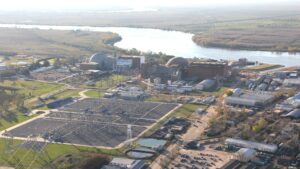Argentina’s relations with China as well as some of its trade agreements are not only raising many questions at home but also having a deep impact in the international arena. Of the more than 200 existing agreements, 40 percent are related to science and technology with a focus on space and nuclear energy, Argentine daily La Nación reported.
The China-Argentina Radio Telescope (CART) project in the San Juan province, which will see the installation of a 40-meter-diameter observation instrument is among the joint initiatives. Both countries are also in the midst of an $8.4 billion negotiation for the construction of the Atucha III power plant, which would operate in Buenos Aires province, although work has yet to begin.
“In the case of Atucha, for China it’s important to sell the Hualong One reactor, and for them this operation in a [strategic] place like Argentina, which already has nuclear power plants, is significant,” Sergio Cesarín, coordinator of the Center for Asia-Pacific and India Studies at the Tres de Febrero National University in Buenos Aires, told Diálogo on June 29.
In February 2022, state-owned company Nucleoeléctrica Argentina, Argentine authorities, and Yu Jianfeng, president of the China National Nuclear Corporation (CNNC), signed a contract for the design, sourcing, and construction of Atucha III in Lima, Buenos Aires province.
Argentina has three nuclear power plants: Atucha I and Atucha II in Lima and Embalse in Córdoba province. “As of today, Argentina and China have not reached an agreement on the financing for the nuclear power plant [Atucha III] or the repayment rates,” Argentine news site Todo Noticias reported. “This means that the project is paralyzed. It’s been six months since any Chinese delegation has visited the Atucha Nuclear Center in Zárate.”

“In Argentina [we are analyzing] the strategic security risk of China being interested in the construction of the Atucha III nuclear power plant, in the CART project, in the eventual construction of a port with a view to Antarctica, or in the exploitation of lithium,” Luis Somoza, an intelligence expert and former professor at the Argentine Armed Forces War College, told Diálogo. “The danger is that of an eventual intelligence apparatus on the part of China at the local and international level.”
The CART initiative establishes that the radio telescope will be located in the El Leoncito Astronomical Complex in Calingasta department, San Juan province. The radio telescope will be the largest in South America, according to the Argentine government. Some 30 Chinese scientists have been on site since March for its installation, Secretary of Science, Technology and Innovation of San Juan Marita Benavente said, La Nación reported.
“That area of San Juan has always been very well categorized and valued by the astronomical field,” Cesarín said. “China seeks to strengthen its space capability and has a network of support or antennas in Latin America.”
The Espacio Lejano Station in Neuquén, in the Argentine Patagonia region, and its 35-meter-diameter antenna, have been operated by the Chinese military for the past five years. The China Satellite Launch and Tracking Control General (CLTC), a division of the Strategic Support Force of the People’s Liberation Army operate the scientific base.
“These radio aids or antennas are intended to support satellite navigation, but there are also certain issues raised by its dual use, because they can serve for defense and military matters, such as missile operations, space station controls, and strategic communications tracking,” Cesarín said.
In late May, Minister of Economy Sergio Massa traveled to China, where he held meetings with Chinese companies to make progress in different electric energy and infrastructure projects being developed in Argentina, such as the Santa Cruz River dam project in Patagonia.
Progress was also made with the financing for the development of two sewage treatment plants to benefit 1.6 million inhabitants. The bilateral meetings also included Chinese mining companies, with whom they worked on investment and lithium production in Argentina, according to official information.
“These investments and penetration interference from China endanger Argentina’s sovereignty, because it is somehow accepted to be under the orbit of the Chinese People’s Party,” Somoza concluded.
Source : DialogoAmericas

